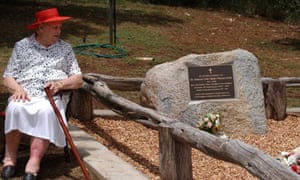To many in Queensland, she was just Lady Flo. A long-serving
Nationals senator, party powerbroker and widow to the state’s
longest-serving leader, Florence Bjelke-Petersen was as famous for her
pumpkin scones and hospitality at the family’s Bethany homestead in
Kingaroy.
But it was her marriage to Sir Joh Bjelke-Petersen, the sunshine state’s most divisive leader – who oversaw what became known as one of the most corrupt governments in the country’s history – that made Lady Bjelke-Petersen part of the fabric of Queensland.
Amid the many tributes from across the political divide pouring in on Wednesday after her death, aged 97, came a tweet from the prime minister, Malcolm Turnbull, who praised not only Flo but Joh himself, thanking the pair for their “vision and leadership”, which helped shaped Queensland.
Thirty years since the Fitzgerald inquiry began to shine a light on
what had become the “moonlight state”, Bjelke-Petersen’s legacy
continues to haunt Queensland.
In the lead-up to the release of the 1987 Queensland cabinet documents – the last of Bjelke-Petersen’s 19 years in power – and the short-lived “Joh for PM” campaign of that year, here is a reminder of the late premier’s “vision and leadership” to which Queensland owes that “success and dynamism”. As the philosopher Voltaire said: “To the living we owe respect, but to the dead we owe only the truth.”
The Joh Bjelke-Petersen government:
But it was her marriage to Sir Joh Bjelke-Petersen, the sunshine state’s most divisive leader – who oversaw what became known as one of the most corrupt governments in the country’s history – that made Lady Bjelke-Petersen part of the fabric of Queensland.
Amid the many tributes from across the political divide pouring in on Wednesday after her death, aged 97, came a tweet from the prime minister, Malcolm Turnbull, who praised not only Flo but Joh himself, thanking the pair for their “vision and leadership”, which helped shaped Queensland.
After her
long life of public service we say thanks to Lady Flo. Rest In peace.
Joh and Flo devoted their lives to Queensland and its success and
dynamism owes so much to their vision and leadership.
In the lead-up to the release of the 1987 Queensland cabinet documents – the last of Bjelke-Petersen’s 19 years in power – and the short-lived “Joh for PM” campaign of that year, here is a reminder of the late premier’s “vision and leadership” to which Queensland owes that “success and dynamism”. As the philosopher Voltaire said: “To the living we owe respect, but to the dead we owe only the truth.”
The Joh Bjelke-Petersen government:
- Came to power by threatening to pull the Country party (as the Nationals were then called) from the Coalition.
- Ignored longstanding traditions and protocols when appointing senators to fill vacancies in the federal upper house, including rejecting the opposition’s nominee and appointing Bjelke-Petersen’s own. His appointment of Albert Field became one of the dominos that led to the dismissal of Gough Whitlam.
- Wielded “state of emergency” declarations as a political weapon to put down dissent.
- Declared a month-long state of emergency to head off anti-apartheid demonstrations during the Springboks’ 1971 tour.
- Banned street marches entirely in 1978.
- Opposed Medicare, which the premier saw as socialism.
- Encouraged the creation of a police state, where opponents and journalists were regularly harassed by uniformed police.
- Openly supported police strong-arm tactics, including the raid of a north Queensland commune where officers burned huts for being “poisonous”.
- Withdrew advertising from a newspaper that printed critical articles, redirecting it to rivals.
- Launched publicly funded defamation actions against opposition MPs.
- Blocked Indigenous groups from being able to own large tracts of land.
- Bjelke-Petersen told one of his ministers (who later forced him out as premier) to allow HIV to wipe out Indigenous communities.
- Banned condom machines, public safe sex campaigns and school sex education programs during the HIV crisis.
- Emboldened the police commissioner, Terry Lewis (later jailed for corruption), to crack down on the gay and lesbian community; attempted to ban gay men – who were publicly denounced as “deviants” – from entering pubs and clubs; encouraged raids (and the closure) of premises suspected of being LGBTI-friendly; arrested men suspected of being gay; considered banning gay men from swimming pools, claiming there was a risk they would contaminate the water with HIV; tried, as other states were decriminalising homosexuality, to make Queensland the first jurisdiction to make being a lesbian illegal.
- Repeatedly warned that “southern homosexuals” were attempting to take control of Queensland.
- Demolished historic buildings, including Brisbane’s much loved Bellevue Hotel, which was destroyed in the middle of the night after public outcry.
- Oversaw raids on suspected abortion clinics.
- Tried to ban women from flying to New South Wales or Victoria if it was suspected they wanted to terminate a pregnancy.
- Fought the 40-hour working week.
- Published the names and addresses of striking electrical workers and encouraged public harassment of them.
- Later sacked 1,100 striking electrical workers, only hiring back those who signed no-strike contracts with worse conditions.
- Was responsible for large tracts of infrastructure, including dams, major expressways and universities (which most likely would still have been built) but oversaw the culture that created the “white shoe brigade” among developers, particularly on the Gold Coast, where bribes for special treatment became common.

No comments:
Post a Comment